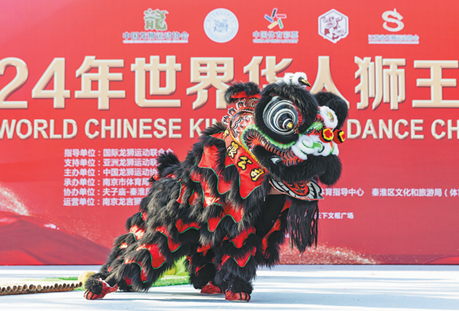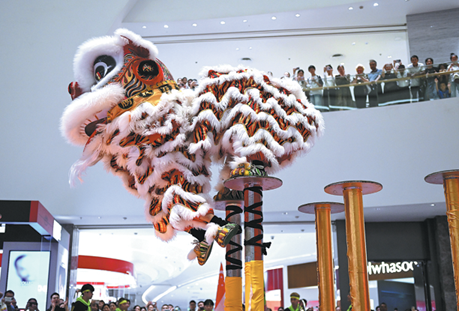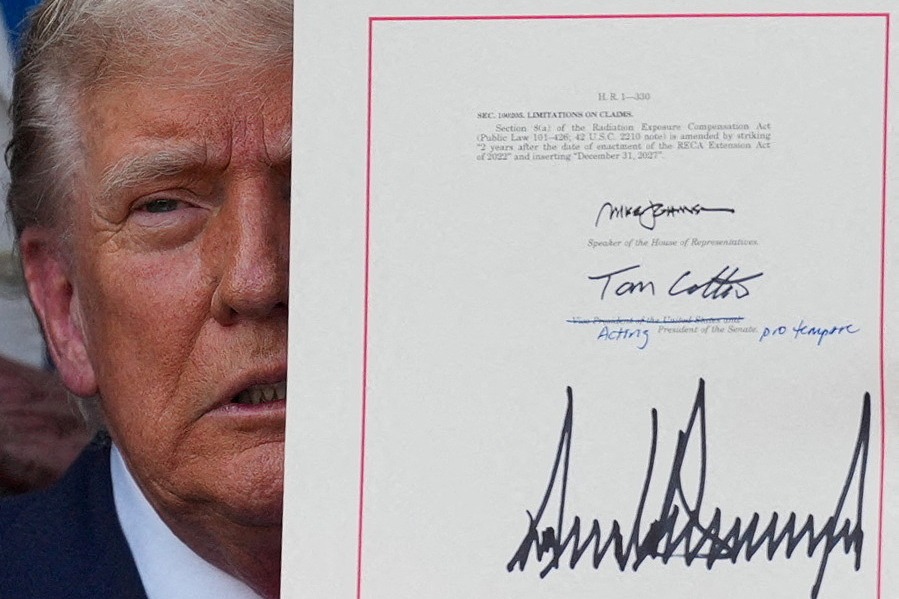Lion dance serves as testament to community and inclusivity

NANJING — For many Chinese born in the 1980s and '90s, the first thing that comes to mind when discussing the lion dance is the martial arts movie Once Upon a Time in China III featuring Jet Li as Chinese martial arts master and folk hero Wong Fei-hung.
In this classic movie, Wong travels from Foshan, Guangdong province, to Beijing for a "Lion Dance King" competition where he confronts political intrigue and the cultural clash between tradition and Western influences. As he navigates personal and national challenges, Wong relies on his martial arts skills to protect his loved ones and uphold his principles, creating a narrative rich in cultural heritage.
The origins of the lion dance date back over a thousand years in China. Traditionally performed during Chinese New Year, cultural festivals and significant occasions, this art form is intended to ward off evil spirits and invite good fortune.
Over time, the lion dance has emerged as a cultural bridge connecting the past and present and the East and the West, through a shared appreciation for its artistic beauty and symbolic significance.
The story of Kelvin Tran, a participant in the 2024 World Chinese King of Lion Dance Championship in Nanjing, Jiangsu province, reflects this journey of cultural transmission.
Born in Australia to grandparents from Chaozhou in South China's Guangdong province, Tran grew up in a Sydney neighborhood where lion dancing thrives. His parents often took him to watch lion dance performances, sparking his interest in the art form.
A family friend introduced him to the practice when he was 8 years old, marking his pivotal step into the world of lion dance. As his passion grew, Tran cofounded the Qing Fong Dragon and Lion Dance Team in 2018.
Within Chinese communities, lion dance is more than just a performance; it is a communal activity that involves intricate teamwork and rigorous training. For 24-year-old Tran, lion dance is a pathway to building and strengthening community ties in Australia.
"Our membership has grown to over 70, so it's quite a big team, and it's gaining popularity, which is great for us," he says. This growth reflects the deepening of relationships among members. "I wouldn't call them just friends; I call them family," Tran emphasizes, highlighting how the lion dance fosters familial bonds that enhance social cohesion.
Moreover, the lion dance is a testament to community and inclusiveness. "We're open to everyone and anyone," Tran explains. "At the moment though, it's mostly Asian demographics but we are more than happy to welcome others onto our teams."
This inclusive philosophy is reflected in the diverse lineup of participants at the 2024 World Chinese King of Lion Dance Championship, which attracted 100 athletes from China, Singapore, Malaysia, Indonesia, Thailand, Australia and Canada, among others.
Unlike Tran, who has Chinese heritage, Syahdatulazmi Bin Bustamam from the Malaysia team discovered his passion for lion dancing two decades ago after attending a performance in his hometown. Captivated by the vibrant display, he fell in love with the art form instantly.
By day, Syahdatulazmi runs a restaurant with his wife but remains committed to practicing as the lion's tail three days a week, dedicating two hours per session.
"I've been doing lion dancing since I was a kid," says the 31-year-old, who is considered "relatively old" in the world of lion dance, through an interpreter. "It's become a hobby for me; I have to do it every day."
Due to adverse weather conditions, the high-pole competition — renowned for its athleticism and acrobatic stunts — was relocated to a shopping mall on the first day of the competition.
Among the audience was 25-year-old Kiki, who was drawn by the sound of gongs and drums. After watching the exciting competition, she says, "I'm happy to see the inheritance of traditional culture. I had only seen performances in China and I didn't realize that different countries each have their own unique features."
The traditional southern lion dance competition, along with dragon dance performances and cultural exchanges related to these ancient traditions, was eventually relocated back to its original venue, the Confucius Temple, a prominent tourist attraction on the banks of the picturesque Qinhuai River in Nanjing.
"A venue like this adds historical and cultural context to the event," says a tourist surnamed Han. "It also provides an authentic cultural experience, making my visit more memorable and enriching. I really enjoy watching the Indonesian team."
Despite not being crowned the "Lion Dance King", Tran was satisfied with his team's performance at their first international competition. "Competing at such a significant landmark in Nanjing, and in China overall, is very special. The architecture and cultural significance are incredibly meaningful to me."
Tran's story touches on the cyclical nature of cultural transmission. As he watched his 2-year-old nephew, who mirrored his introduction to lion dance during childhood, he expressed hope: "It's nice to inspire the younger generation. Hopefully, I'll teach him if he likes it."
During the Qing Dynasty (1644-1911), the time period in Once Upon a Time in China III, the lion dance united communities and asserted cultural identity. Today, it serves as a medium to connect diverse cultures, fostering understanding and respect.
Tran's desire to continue the tradition ensures that the lion dance remains a vibrant, living cultural practice, inspiring future generations as it inspired him, passing on the lion's enduring symbol of power and wisdom.
Xinhua


Today's Top News
- Chengdu games hailed as the new benchmark
- Xi, Lula pledge to deepen China-Brazil cooperation
- China, US reach deal to extend tariff suspension
- Demand for?Nvidia’s H20 chip lackluster
- Washington not incarnation of justice: China Daily editorial
- Tariff truce gains time for talks although some tough issues remain to be resolved






























